|
|
|
Sort Order |
|
|
|
Items / Page
|
|
|
|
|
|
|
| Srl | Item |
| 1 |
ID:
163169
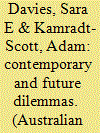

|
|
|
| 2 |
ID:
163172


|
|
|
|
|
| Summary/Abstract |
In 2017, the Australian Government announced the creation of the Indo-Pacific Centre for Regional Health Security. In the same year, the Australian government investment in gender equality and empowerment in overseas development assistance reached the highest percentage ever recorded in Australian aid history. However, the health sector (excluding reproductive and family planning) has the lowest percentage of aid projects where gender equality is being mainstreamed as a primary objective. This article examines why this is the case and suggests what can be done to address the health aid sector’s gender gap. This article argues that in Australia’s largest health aid sector investment, the Indo-Pacific Centre for Health Security, there is a disconnect between the Australian government’s gender empowerment objective and its relative absence of gender inclusion policies and objectives. The solution is to prioritise gender inclusion across all health aid sector programming. Specifically, to study the lessons learned from the Australia’s gender inclusion practices in women’s health aid sector programming and to integrate them into the areas of health research and investment in emerging infectious disease outbreak response.
|
|
|
|
|
|
|
|
|
|
|
|
|
|
|
|
| 3 |
ID:
163176
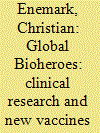

|
|
|
|
|
| Summary/Abstract |
In the pursuit of ‘global health security’, some governments advocate deployment of pharmaceuticals to combat deadly infectious diseases wherever they emerge. Following the Ebola outbreak in West Africa, attention has turned to other emerging diseases and future pharmaceutical solutions. There is growing support for enabling faster clinical research to make new vaccines available sooner. Research on experimental vaccines must ordinarily be consistent with ethical principles designed to protect human research participants. However, where a target disease is framed in security terms, it could be argued that an extraordinary response is required: exposing research participants to more risk in order to accelerate research and enable more lives to be saved pharmaceutically. This article assesses two scenarios of security-oriented research. The scenario envisaged by the Coalition for Epidemic Preparedness Innovations (CEPI) is the propelling of vaccine research through to the stage of human safety-testing before a natural outbreak of the relevant disease. Efficacy and effectiveness tests are then able to be conducted once an outbreak begins. In a hypothetical second scenario, pre-outbreak vaccine research undertaken for the sake of health security would also include efficacy-testing. This would involve the exposure to pathogenic microorganisms of healthy volunteers (‘global bioheroes’) from around the world
|
|
|
|
|
|
|
|
|
|
|
|
|
|
|
|
| 4 |
ID:
163177


|
|
|
|
|
| Summary/Abstract |
The role of regional organisations in dealing with global health challenges cannot be understated. Against current and emerging health threats, strong and effective regional collaboration in health security provides a critical pillar in advancing global health governance, allowing for significant interventions in building health systems capacity at national and regional level, improving disease surveillance and response, and strengthening international efforts in responding to a wide spectrum of global health challenges. While regional health cooperation in Asia has come a long way since the 2003 Severe Acute Respiratory Syndrome crisis and the establishments of regional frameworks in East Asia in fighting pandemics and infectious diseases, more can certainly be done to improve collective efforts to deal with emerging health issues such as climate-related diseases and antimicrobial resistance, as well as rising incidence of non-communicable diseases. The expanding regional and global health agenda should compel ASEAN to work closer toward a more comprehensive human security approach to health—one that does not prioritise pandemics over other health threats, while continuing to strengthen public health systems.
|
|
|
|
|
|
|
|
|
|
|
|
|
|
|
|
| 5 |
ID:
163175
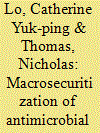

|
|
|
|
|
| Summary/Abstract |
This article has two objectives. Drawing on the framework provided by macrosecuritization, this article first explores global responses to AMR. Secondly, in shifting the analytical lens to Asia, the article then evaluates how successful this process has been in a regional context. Considering the two objectives, two inter-related arguments are proposed. First, even though AMR can be considered a quintessential and successful macrosecuritization case at the global level, within Asia the operationalisation of AMR strategies is limited by power and resource politics within the states. Second, the anthropocentric nature of health security is limited when it comes to address the threat posed by AMR. Overcoming this limitation requires a One Health approach. However, the successful articulation of this approach has proven challenging in Asia where middle-level actors pull away from the process in pursuit of other agendas. As a result, while macrosecuritization provides a useful tool for understanding how AMR and similar health threats are addressed, it is necessary to understand the local realities within which the process is embedded.
|
|
|
|
|
|
|
|
|
|
|
|
|
|
|
|
| 6 |
ID:
163174
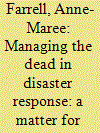

|
|
|
|
|
| Summary/Abstract |
This paper explores the securitisation-desecuritisation nexus in managing threats to health, drawing on a case study examining the management of the dead in disaster response in the Asia-Pacific region. While securitising health threats may galvanise political action to address capacity, infrastructure and resource constraints, it is vital that the shift towards desecuritisation takes place once the immediate threat is under control. This is because desecuritisation is likely to create an environment in which established humanitarian, public health and forensic practices for addressing such threats can proceed in the context of normal politics. It will also offer greater flexibility for pursuing post-threat resilience strategies which will enhance individual and collective health and wellbeing. In turn, this may address broader human security concerns. Conceptualised in this way, resilience should be seen not merely as a strategy for resisting or adapting to a securitised situation but also as a key strategy to be deployed in the context of desecuritisation.
|
|
|
|
|
|
|
|
|
|
|
|
|
|
|
|
| 7 |
ID:
163171
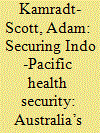

|
|
|
|
|
| Summary/Abstract |
In the wake of several prominent disease outbreaks like Ebola and Zika, global health security is once again high on the international agenda. For its part, the Australian government has committed itself to strengthening regional health security. This policy direction – focusing on the Indo-Pacific region – is both consistent with Australia’s traditional foreign policy approach of concentric circles informing strategic priorities, and is therefore understandable, even predictable. But given that local disease outbreaks in remote locations around the world now have the opportunity to travel rapidly internationally, is the adoption of an exclusively regional focus the most sensible one? This article considers the implications of Australia’s new regional health security initiative, its focus and direction. The paper weighs the benefits and drawbacks of Australia’s new programme and considers whether a wider focus is more appropriate for responding to the health threats of the twenty-first century.
|
|
|
|
|
|
|
|
|
|
|
|
|
|
|
|
| 8 |
ID:
163173


|
|
|
|
|
| Summary/Abstract |
Though global health has attained a prominent position on the global political agenda over the course of a generation, the inauguration of the Trump Administration in the United States threatens to challenge this international consensus. He has evinced scepticism about the value of multilateralism, called for significant cuts to foreign aid, and expressed fear that foreigners would bring disease to the United States. In the face of these challenges and the need to at least maintain current levels of international commitment to global health to prevent reverses in health gains, I argue that the securitisation of health may offer a pragmatic strategy for keeping the United States engaged on global health issues.
|
|
|
|
|
|
|
|
|
|
|
|
|
|
|
|
| 9 |
ID:
163170
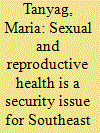

|
|
|
|
|
|
|
|